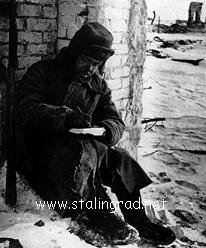|
Lieutenant
Charnosov's last
letter
On his observation post at the top of a shell-wrecked building from
where he called down
artillery fire, Lieutenant Charnosov, an artillery observer from the
384th Artillery Regiment,
wrote a letter to is wife :
Hello, Shura ! I send you kisses to our two little birds, Slavik and
Lydusia. I'm in good health.
I have been wounded twice but these are just scratches and so I still
manage to direct my
battery all right. The time of hard fighting has come to the city of
our beloved leader. (Stalin)
During these days of hard fighting I am avenging my beloved birthplace
of Smolensk,
but at night I go down to the basement where two fair-haired children
sit on my lap.
They remind me of Slavik and Lyda.
On his body was found his wife's previous letter :
I'm very happy that you are fighting so well, she had written, and
that you have been
awarded a medal. Fight to the last drop of your blood, and don't let
them capture you,
because prison camp is worse then death.

This exhange of letters was seen as exemplary, and also as typical of
the moment. They may
well be genuine, but like many others, they revealed only a partial
truth. When soldiers sat
down in the corner of a trench or ill-lit cellar to write home, they
often had trouble expressing
themselves. The single sheet, which would later be folded into a triangle,
like a paperboat,
because there were no envelopes, seemed both too large and too small
for their purposes.
The letter stuck, as a result to three main themes : enquiries after
the family at home,
reassurance (I'm getting along all right - still alive), and preoccupation
with the battle
( we are constantly destroying their manpower and equipment. Day or
night, we won't
leave them in peace). Red Army soldiers in Stalingrad were well aware
that the whole
eyes were on them, but many must have tailored parts of their letters
because they knew
that the Special Departments censored mail carefully.
Even when they wanted to escape when writing to their wife or sweetheart,
the battle
stayed with them always, partly because a man's worth was defined by
the opinion of his
comrades and commander.
Mariya, wrote a certain Kolya, I think you will remember our last evening
together.
Because now, this minute, it is exactly a year since we were parted.
And it was very difficult for me to say goodbye to you. It's very sad,
but we had to be
part because it was the order of the Motherland. We are carrying out
this order as well
as we can. The Motherland requires those of us who are defending this
town to
resistto the end. And we are going to carry out that order.
The majority of Russian soldiers seem to have subsumed their personal
feelings within
the cause of the Great Patriotic War. They may have been more afraid
of the censor
than their German counterparts, they may have been more effectively
brainwashed by
the Stalinist regime, and yet the concept of self-sacrifice comes
across as much as more
than an ideologic slogan. It appears almost atavistic, a moral compulsion
in the face
of the invader.
People might reproach me, wrote a Red Army lieutenant in Stalingrad
to his bride of a
few weeks, if they read this letter about the reason why I'm fighting
for you.
But I can't distinguish where you end, and where the Motherland begins.
You and it are the same for me.

|